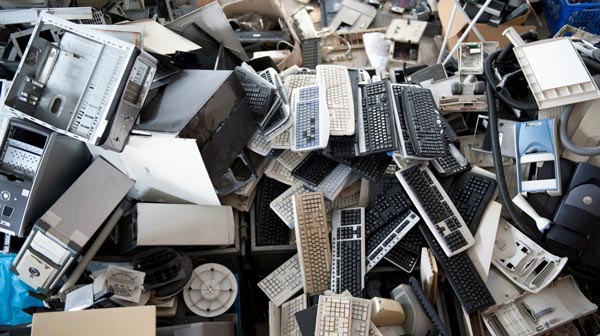Go Eco-friendly with R2 Certification Electronics Recycling Solutions: Focus On the World
Go Eco-friendly with R2 Certification Electronics Recycling Solutions: Focus On the World
Blog Article
Elevate Your E-Waste Monitoring With R2 Certification: a Thorough Review
One key technique to boost e-waste management methods is by acquiring R2 certification. By discovering the advantages and processes associated with R2 certification, a much deeper understanding of just how it can revolutionize e-waste administration strategies emerges, shedding light on a path in the direction of sustainability and moral disposal practices.
Significance of E-Waste Monitoring

When e-waste is not handled properly, these toxic materials can seep right into the ecological community, causing damage to wildlife and potentially getting in the food web, presenting risks to human health and wellness. The inappropriate disposal of e-waste contributes to contamination and greenhouse gas exhausts, intensifying environment adjustment and environmental deterioration.

Advantages of R2 Accreditation

To start with, R2 accreditation boosts reputation by showcasing an organization's devotion to sustainable methods. It assures clients, companions, and stakeholders that the company sticks to stringent requirements for e-waste management - r2 certification. This trustworthiness can lead to enhanced trust fund and improved connections with customers who prioritize ecological duty
Secondly, R2 accreditation aids mitigate dangers related to improper e-waste disposal. By following the stringent standards stated by the certification, companies can reduce the probability of data violations, ecological contamination, and legal repercussions. This proactive method safeguards the firm's reputation and minimizes prospective obligations.
Finally, R2 qualification shows a dedication to ecological stewardship - r2 certification. By responsibly managing electronic waste via accredited procedures, companies add to the preservation of resources, reduction of pollution, and promotion of a round economy. This dedication not just benefits the environment however additionally straightens with evolving consumer assumptions for lasting service practices
R2 Accreditation Process Introduction
Having actually developed the benefits of R2 certification in advertising reliability, danger mitigation, and ecological stewardship, it is vital to currently outline the in-depth procedure associated with acquiring this accreditation. The R2 qualification process starts with a detailed testimonial of the company's operational policies and treatments to ensure conformity with the R2 requirement. This initial analysis is crucial in determining any kind of gaps that need to be resolved before proceeding additionally.
As soon as the organization's methods straighten with the R2 basic needs, an independent third-party auditor conducts an on-site audit to examine the execution and performance of these methods. This audit consists of an extensive review of paperwork, interviews with staff, and physical evaluations of centers to validate compliance.
Following a successful audit, the company obtains a certification choice based upon the auditor's findings. If approved, the company is granted R2 accreditation, showing its dedication more information to accountable e-waste management. It is very important to keep in mind that preserving R2 certification needs ongoing compliance with the requirement's needs and routine audits to ensure continued adherence to finest practices in e-waste recycling and disposal.
Key Criteria for R2 Conformity
An essential facet of achieving R2 conformity is guaranteeing that all digital waste (e-waste) handling facilities meet rigorous ecological and security standards. To adhere to R2 requirements, organizations need to follow essential requirements that concentrate on responsible e-waste administration techniques. These requirements consist of carrying out a documented environmental, wellness, and security management system, ensuring the safe and secure handling of data-containing tools, and conducting extensive downstream due persistance to track the final location of e-waste products.
Moreover, R2 compliance necessitates the appropriate right here screening, refurbishment, and recycling of digital devices to expand its beneficial life and lessen ecological influence. Facilities looking for R2 accreditation have to likewise prioritize employee health and wellness by providing necessary training, individual safety tools, and a risk-free functioning setting. Additionally, keeping detailed records of e-waste handling activities and frequently undergoing audits by accredited licensing bodies are essential components of showing recurring conformity with R2 standards.
Influences of Sustainable E-Waste Practices
The implementation of sustainable e-waste techniques according to R2 conformity not just ensures ecological and safety standards are satisfied yet additionally significantly influences the overall lifecycle of digital items. By adhering to R2 requirements, electronic waste monitoring processes become more effective, decreasing the environmental impact of digital products. Sustainable e-waste techniques facilitate the correct disposal of digital components, ensuring that unsafe materials are handled properly and do not finish up contaminating the environment.
In addition, accepting lasting e-waste methods promotes the circular economy by facilitating the recovery and reuse of useful products from electronic products. This not just preserves priceless sources however likewise reduces the need for raw product extraction, lessening the ecological influence of electronic production. Furthermore, sustainable e-waste practices can add to work development in the recycling and refurbishment markets, cultivating economic growth while advertising environmental obligation. On the whole, the fostering of sustainable e-waste methods under R2 qualification serves as a crucial step in the direction of attaining an extra ecologically lasting electronics sector.
Final Thought
Finally, carrying out proper article e-waste management techniques is vital for environmental sustainability and source preservation. R2 accreditation plays an essential function in making sure liable handling and disposal of digital waste. By sticking to the strict standards set forth by R2 criteria, organizations can not only reduce their ecological impact but also add to an extra lasting future for generations to come.
One trick approach to elevate e-waste administration practices is by acquiring R2 accreditation. By checking out the advantages and processes associated with R2 certification, a deeper understanding of exactly how it can reinvent e-waste monitoring methods arises, losing light on a course towards sustainability and moral disposal methods.
The R2 certification process begins with a comprehensive testimonial of the organization's functional policies and procedures to ensure conformity with the R2 requirement. If authorized, the organization is given R2 certification, demonstrating its dedication to accountable e-waste administration. Overall, the adoption of lasting e-waste practices under R2 accreditation offers as a critical action towards attaining a much more environmentally sustainable electronics industry.
Report this page